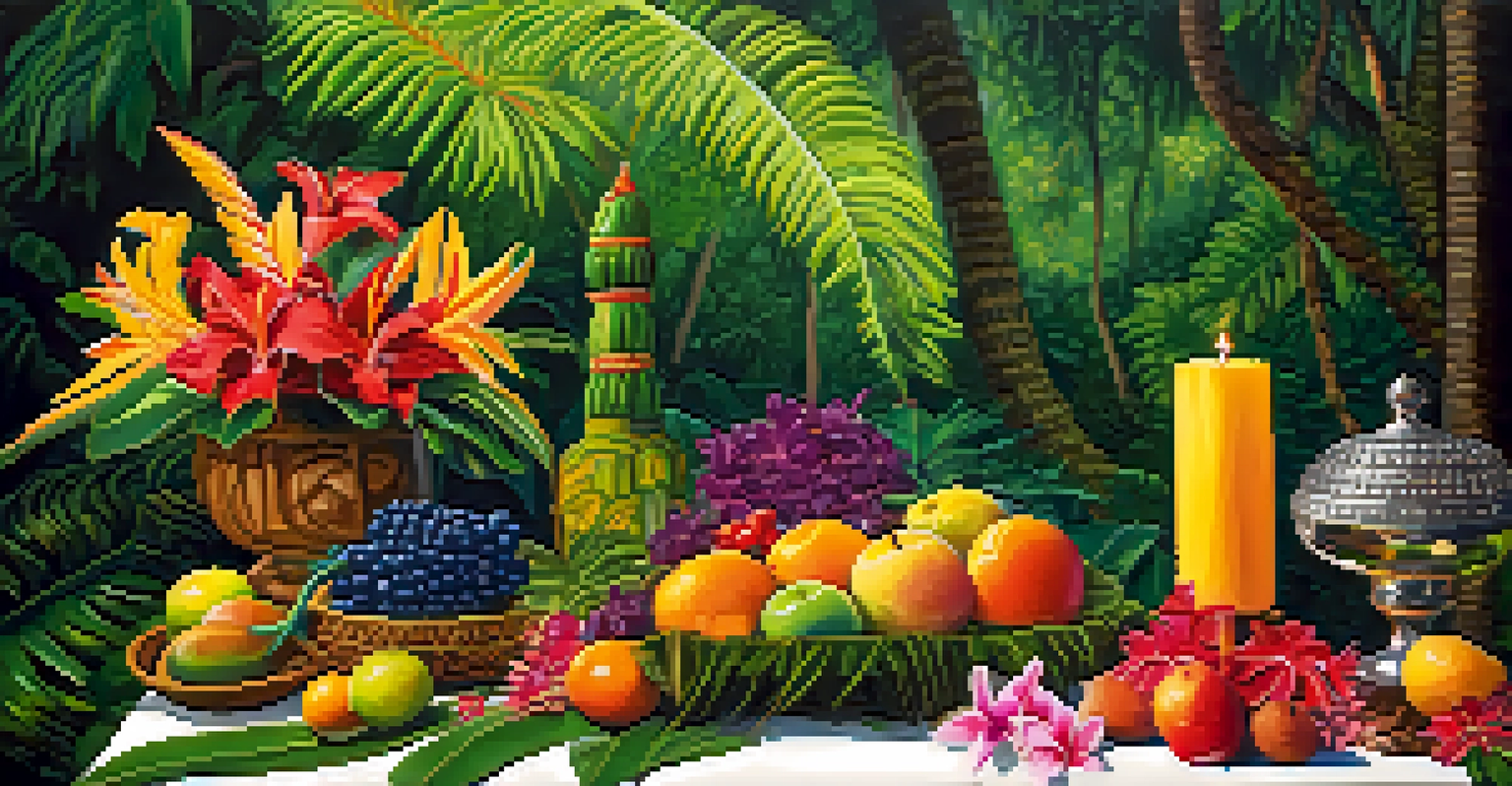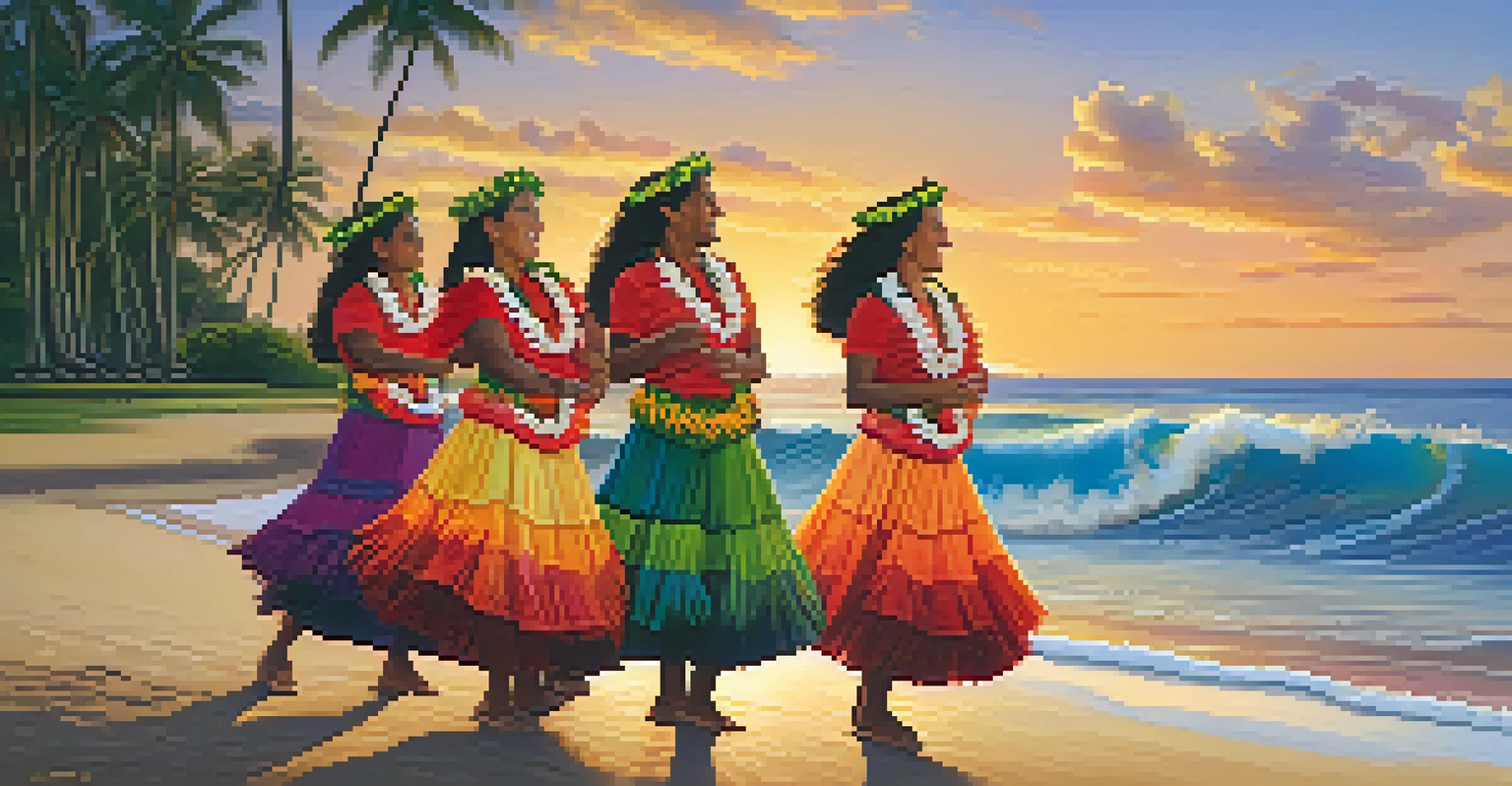The Spiritual Significance of Hawaiian Rituals and Ceremonies

Understanding Hawaiian Spirituality and Its Roots
Hawaiian spirituality is deeply intertwined with the land, sea, and sky, reflecting a profound respect for nature. This belief system, known as 'Aloha ʻĀina,' emphasizes the connection between the people and their environment. The spiritual significance of Hawaiian rituals stems from centuries of tradition, where each ceremony is designed to honor gods, ancestors, and the natural world.
Hawaiian spirituality is not just a belief system, but a way of life that emphasizes our connection to the land and to each other.
Many Hawaiian practices are rooted in the concept of mana, which refers to spiritual energy or power. This energy can be cultivated and shared through rituals, helping individuals connect with their inner selves and the world around them. Thus, understanding Hawaiian spirituality means recognizing the importance of mana in daily life and ceremonial practices.
These rituals often involve various elements like chants (oli), hula, and offerings, each carrying its own significance. By participating in these ceremonies, Hawaiians not only honor their ancestors but also reinforce their identity and cultural heritage.
The Role of Rituals in Hawaiian Culture
Rituals play a pivotal role in Hawaiian culture, serving as a bridge between the physical and spiritual realms. They are community events that foster unity, allowing participants to strengthen their bonds with each other and the divine. These gatherings often create a sense of belonging, which is essential in a culture that values collective identity.

Each ritual is meticulously planned and executed, often involving specific chants, dances, and offerings that are believed to invoke blessings from the gods. For instance, during a traditional luau, not only is food shared, but it also becomes a way to express gratitude and celebrate life. Such ceremonies embody the essence of aloha, or love, that permeates Hawaiian culture.
Hawaiian Spirituality is Nature-Centric
Hawaiian spirituality, rooted in 'Aloha ʻĀina,' emphasizes the deep connection between people and their environment.
Moreover, rituals are often tied to significant life events such as births, weddings, and funerals. These ceremonies provide a sacred space for individuals and families to honor transitions, showcasing the importance of spirituality in every stage of life.
Common Hawaiian Rituals and Their Meanings
Some of the most well-known Hawaiian rituals include the ho'ola ceremony, which focuses on healing, and the kanaka maoli, celebrating the indigenous people of Hawaii. Each of these rituals is imbued with deep meanings and serves specific purposes, whether it be healing the body, mind, or spirit. Understanding these rituals allows outsiders to appreciate the rich cultural tapestry of Hawaii.
In every ritual, we honor our ancestors and reinforce the values that shape our identity and community.
Another significant ritual is the makahiki season, a time dedicated to honoring the god Lono, who represents fertility and agriculture. This period is marked by feasting, games, and various ceremonies, allowing communities to come together in celebration and gratitude. It emphasizes the importance of sustainability and respect for the land.
Rituals like the makahiki reveal how interconnected Hawaiian spirituality is with the cycles of nature. Each event is not only a celebration but also a reminder of the responsibilities Hawaiians have to their environment and each other.
The Significance of Offerings in Rituals
In Hawaiian rituals, offerings hold immense significance as a way to express gratitude and seek blessings. These offerings, known as 'ho'okupu,' can range from flowers and food to crafted items that symbolize respect and appreciation for the divine. By presenting these gifts, participants acknowledge their interconnectedness with the spiritual world.
The act of giving is not just about the items themselves but also about the intention behind them. When Hawaiians make offerings, they do so with a pure heart, aiming to foster a relationship with their ancestors and deities. This practice highlights the deep respect for the past while nurturing spiritual growth.
Rituals Foster Community and Identity
Rituals in Hawaiian culture serve as vital expressions of identity, bringing communities together and honoring their rich heritage.
Furthermore, offerings often accompany specific chants and prayers that enhance their significance. This combination of physical gifts and verbal expressions creates a powerful spiritual connection that resonates deeply within the Hawaiian culture.
Rituals as Expressions of Identity
For many Hawaiians, rituals are vital expressions of identity and cultural pride. They serve as a reminder of the rich history and traditions that have been passed down through generations. Engaging in these practices helps individuals reconnect with their roots and fosters a sense of belonging within the community.
Rituals are not only about honoring the past; they also empower the present generation to carry forward their heritage. By participating in traditional ceremonies, younger Hawaiians learn the values and teachings that shape their identity, ensuring that the culture remains vibrant and alive.
Moreover, these expressions of identity are crucial in a world where cultural homogenization is prevalent. Through rituals, Hawaiians assert their unique cultural narrative and reaffirm their place in the larger tapestry of human experience.
Healing Through Hawaiian Spiritual Practices
Healing is a central theme in many Hawaiian rituals, with spiritual practices aimed at restoring balance and harmony. The concept of healing extends beyond the physical realm, encompassing emotional and spiritual well-being as well. Various ceremonies, such as ho'ola, focus on rejuvenating the spirit and providing a sense of peace.
In Hawaiian culture, the belief in the interconnectedness of mind, body, and spirit is paramount. This holistic approach to healing emphasizes that true wellness comes from addressing all aspects of a person’s being. Through rituals, participants often find solace and strength, allowing them to navigate life's challenges with greater resilience.
Healing is Central to Ritual Practices
Hawaiian rituals focus on holistic healing, addressing emotional, spiritual, and physical well-being through communal support.
Additionally, the communal aspect of these healing rituals fosters support among participants. When individuals come together to heal, they create a nurturing environment where shared experiences and collective strength can lead to profound transformations.
The Future of Hawaiian Rituals and Their Preservation
As modern influences continue to shape Hawaiian society, the preservation of traditional rituals and ceremonies is more crucial than ever. Many Hawaiians are actively working to ensure that their spiritual practices remain vibrant and relevant, despite the challenges posed by globalization. This commitment reflects a deep respect for their ancestors and an understanding of the importance of cultural continuity.
Community initiatives, educational programs, and cultural festivals play a pivotal role in keeping these traditions alive. By sharing their practices with younger generations, elders pass down not just the rituals, but also the underlying values that define Hawaiian spirituality. This intergenerational exchange fosters a strong sense of identity and belonging.

Ultimately, the future of Hawaiian rituals lies in the hands of the community. By embracing their past while adapting to the present, Hawaiians can ensure that their spiritual traditions endure, continuing to inspire and uplift future generations.